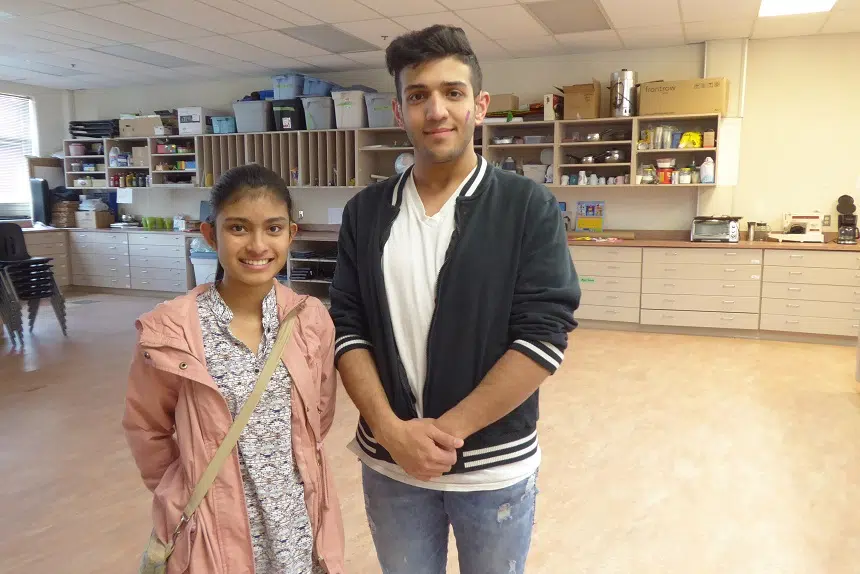Grinning faces stare across this classroom at Winston Knoll Collegiate, but the students aren’t listening for a joke from a friend or rebuke from the teacher; these kids are watching each other’s hands to speak.
The Deaf Crows Collective has been operating for about four years as a way to help deaf youth improve their reading and communication, but it has become more than that for the teens.
This is Fatima Nafisa’s fourth year in the program. She uses sign language to speak, and her teacher translates. Nafisa said the program is her favourite place to be and it has changed her a lot.
“Before … I didn’t feel really any confidence but the arts helped me to feel confident. It has helped me to make decisions about my expression about my own deaf feelings and deaf experiences, and when I’m putting down different colours and things in my art, it helps me to help others understand how I’m feeling inside,” she said.
She likes the art the students do and says having artists come in and teach helps her focus on deep experiences and learn things like the meaning of a colour.
Mustafa Alabssi was showing a short film he made this day in class. There was no sound, just silence as the actors went through their paces.
Alabssi moved to Canada from Syria and came into the Deaf Crows program. He said when he was in Syria he didn’t understand much of anything.
“I didn’t have any connection there; there wasn’t much help there in Syria. I didn’t understand how to read or write, I didn’t know anything about life. But when I arrived here, it’s interesting, I understood more (with) more confidence,” Alabssi said through an interpreter.
He loves the drama aspect of the classes and said he loves both the experience and the support the students give each other.
The program started as an idea between Chrystene Ells and Joanne Weber, a teacher of the deaf. According to Ells, Weber was seeing more and more issues with deaf teens coming into school with extremely low literacy levels.
The two talked about how art can access parts of the brain and a person’s inner life that academics may not — and so the Deaf Crows Collective was born.
Ells explained there was near immediate success.
In the three-month test program, the students’ reading levels went up a full grade. Ells tells the story of a young girl in the program who would only read the first half of a word, then guess at the second half. Then while drawing, Ells found she would only draw the left half of a picture. Ells kept working with her on drawing until one day that changed.
“She just crossed that border, she made the leap and she drew the whole thing. And that same exact week she started reading whole words and not missing the right-hand side of the word,” she said.
The program isn’t just about academic outcomes. Ells said from the beginning to now, she has seen a huge change in the youth involved.
“These projects that we’re doing give these people who’ve never had a way of expressing themselves other than a few gestures and pointing and kind of dealing with immediate things like ‘I need food’ or ‘Where’s the bathroom?’ ” Ells said. “Maybe now they’re able to actually express what’s going on inside of them, the feelings that they have, the thoughts that they have, tell stories about what they’ve experienced because they’ve been given language for the first time.”
She explained the academics are giving the students language and a sense of self, while the art is giving them ways to express themselves and find what they want to say.
“They’ve also created a community where they feel like they can have a place where they are safe and where they’re normal,” said Ells.
The group started out doing things like drawing and painting but expanded into a drama a few years ago. They wrote a play called “Deaf Crows” and it was so well-received in Regina that they took it to a deaf drama festival in Edmonton, where it also got glowing reviews. They followed that up with Apple Time, which was also well-received.
The program has also gotten attention from the Saskatchewan Advocate for Children and Youth. In his recent annual report, he highlighted the Deaf Crows Collective, along with several other programs, as innovative and having positive outcomes for students.
“Participation in Deaf Crows Collective has increased the confidence of the DHH students, who are now empowered to speak out on the challenges they face. They have written letters to politicians, the Saskatchewan Human Rights Commission, non-profit agencies and several government officials outlining their struggle to access technology, sign language interpreters, and additional opportunities for schooling and employment,” read the outline in the advocate’s report.
Currently, the program is run through a grant from the Saskatchewan Arts Board, but Ells said that can’t last forever. She wants to see the school division or province fund this program and others like it.







